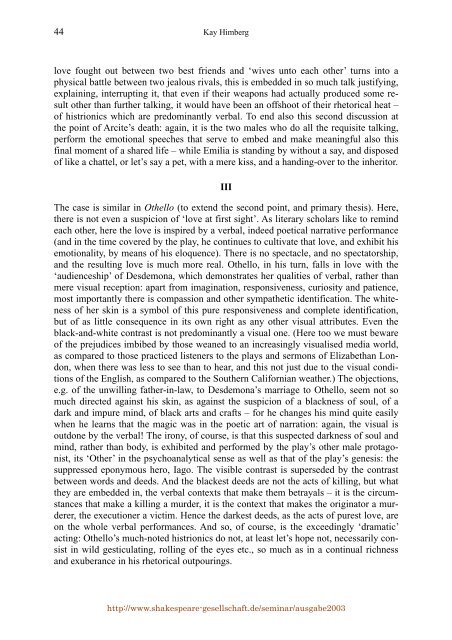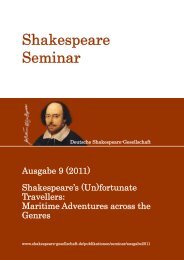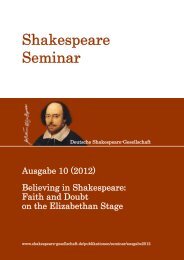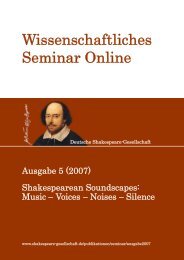Wissenschaftliches Seminar Online 1 (2003) - Shakespeare ...
Wissenschaftliches Seminar Online 1 (2003) - Shakespeare ...
Wissenschaftliches Seminar Online 1 (2003) - Shakespeare ...
Create successful ePaper yourself
Turn your PDF publications into a flip-book with our unique Google optimized e-Paper software.
44<br />
Kay Himberg<br />
love fought out between two best friends and ‘wives unto each other’ turns into a<br />
physical battle between two jealous rivals, this is embedded in so much talk justifying,<br />
explaining, interrupting it, that even if their weapons had actually produced some result<br />
other than further talking, it would have been an offshoot of their rhetorical heat –<br />
of histrionics which are predominantly verbal. To end also this second discussion at<br />
the point of Arcite’s death: again, it is the two males who do all the requisite talking,<br />
perform the emotional speeches that serve to embed and make meaningful also this<br />
final moment of a shared life – while Emilia is standing by without a say, and disposed<br />
of like a chattel, or let’s say a pet, with a mere kiss, and a handing-over to the inheritor.<br />
III<br />
The case is similar in Othello (to extend the second point, and primary thesis). Here,<br />
there is not even a suspicion of ‘love at first sight’. As literary scholars like to remind<br />
each other, here the love is inspired by a verbal, indeed poetical narrative performance<br />
(and in the time covered by the play, he continues to cultivate that love, and exhibit his<br />
emotionality, by means of his eloquence). There is no spectacle, and no spectatorship,<br />
and the resulting love is much more real. Othello, in his turn, falls in love with the<br />
‘audienceship’ of Desdemona, which demonstrates her qualities of verbal, rather than<br />
mere visual reception: apart from imagination, responsiveness, curiosity and patience,<br />
most importantly there is compassion and other sympathetic identification. The whiteness<br />
of her skin is a symbol of this pure responsiveness and complete identification,<br />
but of as little consequence in its own right as any other visual attributes. Even the<br />
black-and-white contrast is not predominantly a visual one. (Here too we must beware<br />
of the prejudices imbibed by those weaned to an increasingly visualised media world,<br />
as compared to those practiced listeners to the plays and sermons of Elizabethan London,<br />
when there was less to see than to hear, and this not just due to the visual conditions<br />
of the English, as compared to the Southern Californian weather.) The objections,<br />
e.g. of the unwilling father-in-law, to Desdemona’s marriage to Othello, seem not so<br />
much directed against his skin, as against the suspicion of a blackness of soul, of a<br />
dark and impure mind, of black arts and crafts – for he changes his mind quite easily<br />
when he learns that the magic was in the poetic art of narration: again, the visual is<br />
outdone by the verbal! The irony, of course, is that this suspected darkness of soul and<br />
mind, rather than body, is exhibited and performed by the play’s other male protagonist,<br />
its ‘Other’ in the psychoanalytical sense as well as that of the play’s genesis: the<br />
suppressed eponymous hero, Iago. The visible contrast is superseded by the contrast<br />
between words and deeds. And the blackest deeds are not the acts of killing, but what<br />
they are embedded in, the verbal contexts that make them betrayals – it is the circumstances<br />
that make a killing a murder, it is the context that makes the originator a murderer,<br />
the executioner a victim. Hence the darkest deeds, as the acts of purest love, are<br />
on the whole verbal performances. And so, of course, is the exceedingly ‘dramatic’<br />
acting: Othello’s much-noted histrionics do not, at least let’s hope not, necessarily consist<br />
in wild gesticulating, rolling of the eyes etc., so much as in a continual richness<br />
and exuberance in his rhetorical outpourings.<br />
http://www.shakespeare-gesellschaft.de/seminar/ausgabe<strong>2003</strong>





